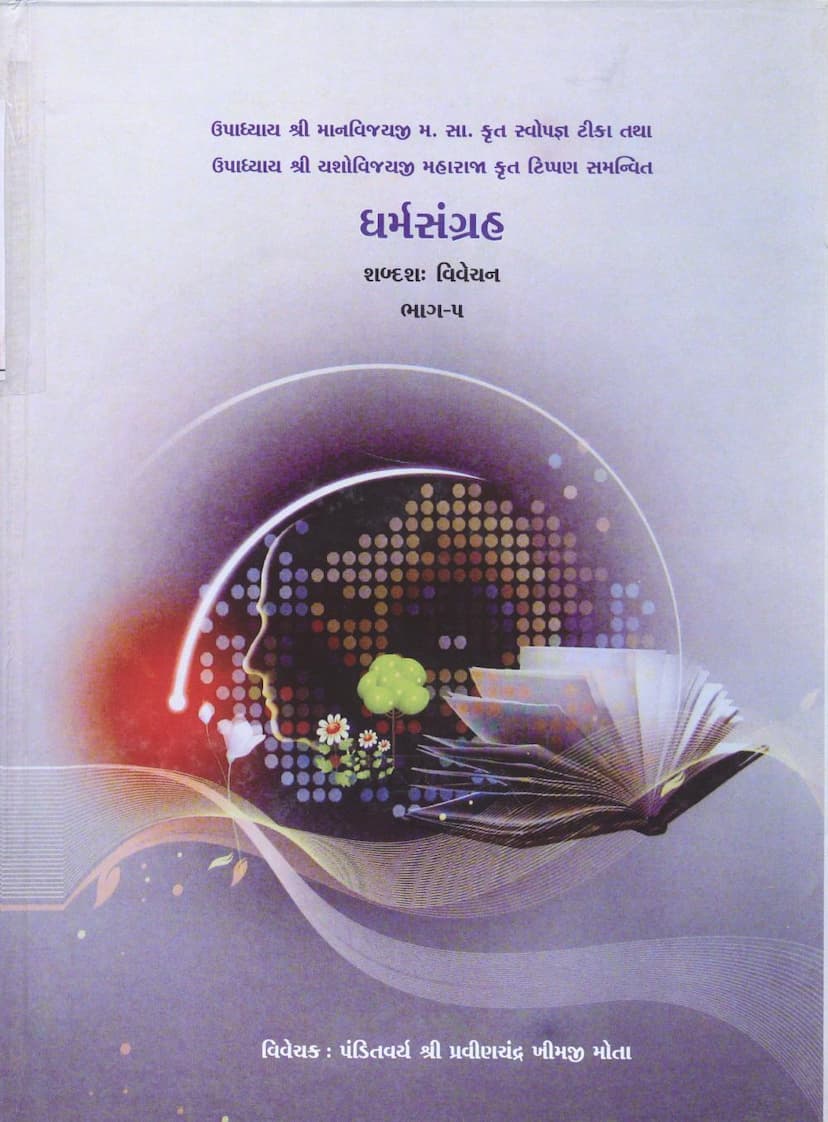Dharm Sangraha Part 05
Added to library: September 1, 2025

Summary
Here's a comprehensive summary of the provided Jain text, "Dharm Sangraha Part 05," authored by Pravin K Mota, published by Gitarth Ganga, focusing on the content presented in the pages:
Overall Context:
This document, "Dharm Sangraha Part 05," is part of a larger series offering a detailed, verse-by-verse analysis (शब्दशः वि<bos> ः) of Jain texts. This particular volume is a commentary on the "Dharm Sangraha" authored by Upadhyay Shri Manvijayji Maharaj, with further annotations by Upadhyay Shri Yashovijayji Maharaj. The current commentary is by Pandit Shri Pravinchandra Khimji Mota. The publication is dedicated to various esteemed Acharyas and Munis, indicating a strong lineage of Jain scholarly tradition.
Key Themes and Content of Part 05:
Based on the provided pages, Part 05 of this commentary primarily focuses on the daily conduct and responsibilities of a Jain layperson (Shravak), particularly emphasizing their adherence to religious principles in their worldly activities and their interactions with the religious order (monks and nuns).
Detailed Summary of Content:
-
Introduction and Purpose: The initial pages highlight the importance of understanding the deeper secrets of Jainism beyond mere acquisition of the faith. It emphasizes that true liberation requires not just knowing the path but also steadfast devotion and a firm commitment to practice. The Gitarth Ganga institution aims to bring these secrets to light through its publications.
-
Commentary Style: The text explains that the original work by Upadhyay Shri Manvijayji is being analyzed word-for-word. The commentary by Pandit Shri Pravinchandra Mota aims to elucidate the principles and nuances of Jain dharma in a clear and accessible manner.
-
Core Subject Matter (Second Chapter - Shravak's Daily Routine):
- Ashatana Pariksha (Analysis of Offenses): A significant portion of the text is dedicated to a detailed explanation of various "Ashatanas" (offenses or transgressions) that a layperson might commit, particularly in relation to the Jain principles, places of worship, religious paraphernalia, and interactions with monks and nuns. The text elaborates on these offenses, categorizing them into different levels (Jaghanya - minor, Madhyama - intermediate, Utkrushta - major) and providing numerous examples. This section is extensive, listing many specific actions that constitute offenses.
- Devadravya Rakshan (Protection of Deva Dravya - Religious Property): The text discusses the responsibilities of a layperson towards the protection and proper use of religious property, including offerings, temple upkeep, and the property associated with religious knowledge and the monastic order.
- Guru Vandana Vidhi (Procedure for Saluting Monks/Nuns): A detailed description of the etiquette and proper procedure for showing respect and saluting monks and nuns is provided, including the specific postures, gestures, and utterances involved. It mentions various aspects like saluting according to one's strength and the proper way to approach them.
- Pratyakhyana (Renunciation/Vow Taking): The text explains the nature of Pratyakhyana, its different types, the places of articulation, the rules, and the fruits of observing these vows. It emphasizes the importance of taking vows correctly and the proper procedures involved.
- Dharmopadesha Shravan Vidhi (Procedure for Listening to Religious Discourses): The text outlines the proper conduct and etiquette to be followed while listening to religious sermons, including aspects like appropriate seating, attentiveness, and respectful engagement.
- Supatra Dana (Giving to Worthy Recipients): The text discusses the principles of giving charity to worthy recipients, emphasizing the discernment required in identifying and supporting those who are truly on the spiritual path.
- Pratikramana (Confession and Repentance): A substantial part of the content is dedicated to explaining the rituals and procedures of Pratikramana, which is a daily or periodic act of confession and repentance for one's transgressions. This includes detailed descriptions of the various types of Pratikramana (Daivasika - daily, Ratrika - nightly, Pakshika - fortnightly, etc.) and the specific procedures associated with them.
- Importance of Purity and Conduct: Throughout the sections on daily routines and interactions, the emphasis is on maintaining purity in actions, thoughts, and speech, and adhering to the Jain way of life in all aspects.
-
Philosophical and Ethical Underpinnings: The text implicitly weaves in core Jain principles like Ahimsa (non-violence) in the context of avoiding offenses and respectful conduct, Aparigraha (non-attachment) in the context of wealth management and charity, and Anekantavada (many-sidedness) in understanding the nuances of religious practice. The detailed explanation of offenses highlights the meticulousness required in Jain practice to avoid even minor transgressions.
-
Inclusion of Scholarly Tradition: The detailed referencing of previous Acharyas and commentaries, along with the meticulous exposition of rituals and rules, showcases the deep respect for and adherence to the Jain scriptural tradition. The text also acknowledges the contribution of scholars and the lineage of guidance from esteemed Gurus.
-
Practical Guidance for Laypersons: The document serves as a practical guide for Jain laypeople, outlining their duties and responsibilities in upholding their faith in their daily lives, from personal conduct to interactions with the religious community and the management of worldly affairs.
In essence, Dharm Sangraha Part 05, as presented in these pages, is a rigorous and detailed explanation of the practical aspects of Jainism for lay followers, focusing on ethical conduct, adherence to vows, proper etiquette with the monastic order, and the meticulous observance of daily religious duties and purification rituals. The commentary aims to provide a thorough understanding of these principles by dissecting each aspect from the original scriptures.